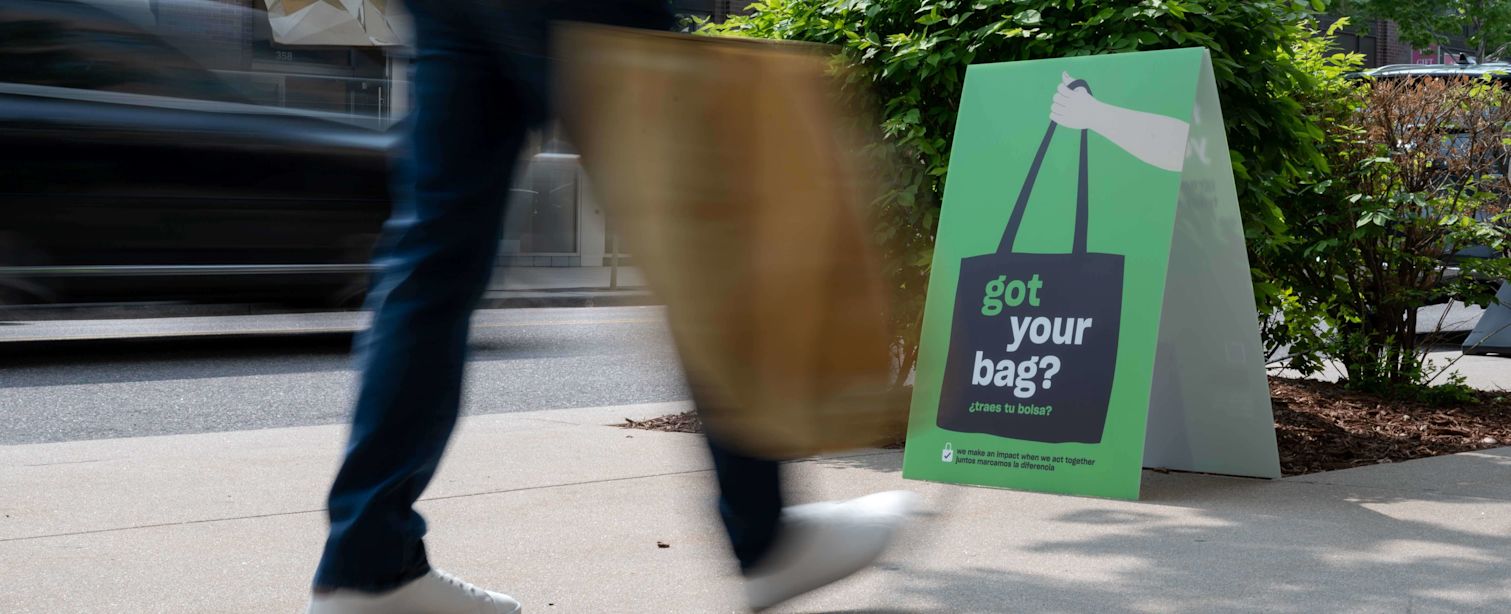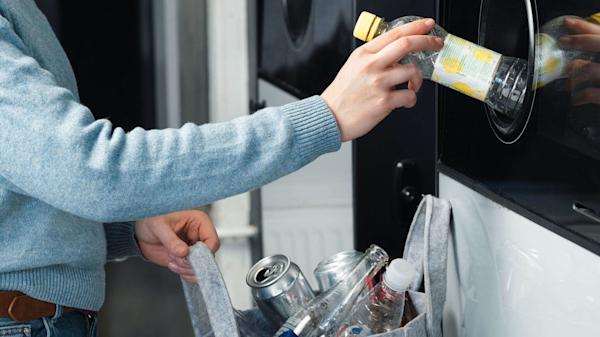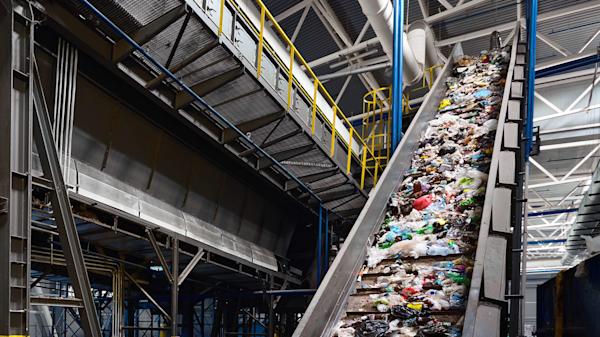In brief
Confronted by mounting plastic bag waste and new regulations, leading US retailers joined forces with Closed Loop Partners’ Center for the Circular EconomyCircular EconomyA systems solution framework that tackles global challenges like climate change, biodiversity loss, waste, and pollution. It is based on three principles, driven by design: eliminate waste and pollution, circulate products and materials (at their highest value), and regenerate nature. (“the Closed Loop Center”) to shift systems and consumers away from single-use bags. Together, they brought over 160 retailers across two cities to promote the use of reusable bags. The result: disposable bag use dropped, equivalent to preventing the annual circulation of more than 9.5 million single-use bags. This case study shows how collective effort between direct competitors can accelerate innovation and shift consumer behaviour at scale.
The mounting waste challenge
12 minutes: that's the average lifespan of a plastic bag from checkout to disposal. Each year, 5 trillion plastic bags are consumed globally and less than 10% are recycled. The rest often pollute land and waterways.
To stem this tide, governments have been introducing bans and fees on single-use bags, prompting retailers to explore new ways of meeting customer needs while reducing costs and waste. With direct access to millions of consumers, retailers play a pivotal role in both the problem and solution – but driving consumer behaviour away from single-use bags towards alternatives has proved tricky, especially when it comes to convenience.
Determined to resolve this, the Closed Loop Center formed the Consortium to Reinvent the Retail Bag in 2020 with Founding Partners CVS Health, Target, and Walmart. The Consortium launched the Beyond the Bag Initiative, a multi-year initiative to identify, test, and implement viable design solutions and models for eliminating single-use bag waste. The Consortium collaborates with diverse stakeholders across the value chain, including several large national retailers. Today, the Consortium works with retailers including Target, CVS Health, Kroger, Dollar Tree, Meijer, and Walmart.
The Beyond the Bag Initiative – collective learning
The Consortium spent its early years rigorously analysing and experimenting with single-use bag waste. In 2020, it launched the Beyond the Bag Challenge with OpenIDEO, inviting innovators, suppliers, and designers to reimagine how consumers took their in-store shopping home. From hundreds of submissions, nine winners were selected for their solutions across three key impact areas: driving reduction, advancing reusereuseThe repeated use of a product or component for its intended purpose without significant modification., and switching to renewable materialsrenewable materialsMaterials that are continually replenished at a rate equal to or greater than the rate of depletion. where reuse is not an option.
To test real-world viability, reuse-specific solutions were piloted in store at CVS, Target, and Walmart locations in Northern California. The pilots followed two core principles: ensure a consistent reuse experience across retailers and use several interventions to build customer engagement. Each retailer committed multiple store locations and trained staff, while the Consortium provided signage and real-time data collection. Across the locations, customers could try new options, such as borrowable bags, reminder apps, or incentive programmes to promote reuse. User feedback was gathered to refine these solutions, while cross-retailer deployment allowed the Consortium to observe customer behaviour, employee insights, and bag movement between stores.
The pilots provided valuable insights, showing that while innovative solutions like borrow-a-bag can engage customers, simpler, low-cost strategies are more effective and scalable in the near term. These learnings are captured in the report Beyond the Plastic Bag: Sparking a Seachange for Reuse, which laid the foundation for the next phase. In 2023, the Consortium pivoted toward more tactical, near-term solutions, leading to the release of The Playbook, a toolkit of proven interventions in bag and fixture design, customer incentives, communications, and employee training.
Developing the ‘Bring Your Own Bag’ campaign
In 2023, the Consortium launched a three-month, multi-city campaign encouraging customers to build the habit of bringing their bag or going without one. With unified messaging across multiple retailers and entire cities, Bring Your Own Bag aimed to simplify communication and raise awareness on a larger scale. Using open-source assets, the collaboration extended beyond retail, engaging city governments, nonprofits, and local business groups to maximise reach and community involvement.
The shared campaign was implemented in two US cities: Denver, Colorado, where the government had mandated a USD 0.10 bag fee, and Tucson, Arizona, which lacked a relevant policy or regulation. More than 160 retailers, from local shops to national chains, participated across over 375 stores. Implementation included near- and in-store signage, out-of-store marketing, community outreach, and cashier prompts to remind customers about their bag choices.
Collaboration has been critical to the Beyond the Bag Initiative’s impact to date. Through our work to bring the world’s leading retailers together with cities and local partners, we are supporting customers to shift their habits towards reuse, moving the needle on reducing single-use bag waste.
– Kate Daly, Managing Partner and CEO of the Center for the Circular Economy at Closed Loop Partners.

Amplifying the impact
The Closed Loop Center compared customer behaviour before and after the campaign, evaluating customer, operational, financial, and environmental impact through onsite interviews and observations throughout.
Reaching over 2.1 million people across the two cities led to a nearly 5% reduction in customers using single-use bags over the three-month period. However, results varied significantly between Denver and Tucson. Both cities ran the same overarching campaign, but in Denver – where customers already paid a USD 0.10 fee for single-use bags and cashier prompts were more consistent – interventions achieved an 11% reduction. In Tucson, where single-use bags were free and cashier prompts were less frequent, the reduction was 2%.
Building on the success of this campaign, the Consortium is scaling its efforts to larger markets in 2025 and 2026. The new campaign kicked off in Southern California and brings together around 1,000 stores across the region. Understanding the importance of retailer engagement and the need for internal buy-in, the Consortium is identifying champions across different teams and tailoring flexible strategies for individual retailers. This will allow companies to implement changes on their own timelines while still benefiting from shared insights and collective progress. Like the last campaign, all assets including printable signage, social media assets, and virtual training are available to anyone looking to get involved.
Financing: All funding for the Consortium and individual in-market initiatives comes directly from the participating retailers. The founding Consortium Partners, CVS, Target, and Walmart, collectively committed more than USD 15 million to launch the Beyond the Bag Initiative in 2020. Notably, the 2020 innovation challenge awarded the nine winning startups a total of USD 1 million in prize money. The participating retailers also dedicate their time, retail locations, and trained staff.
A blueprint for shifting consumer behaviour for the circular economy
By working together across retailers, the Consortium to Reinvent the Retail Bag discovered that consumer habits, long considered difficult to change, can be influenced with the right mix of aligned messaging, interventions, and consistency. After years of experimentation and knowledge sharingsharingThe use of a product by multiple users. It is a practice that retains the highest value of a product by extending its use period., the Consortium developed a unified, credible industry voice that propelled the campaign’s reach beyond what any individual brand could have done. Because of the campaign, nearly 9.5 million fewer single-use bags were projected to be used annually.
Various behaviours will need to change in the circular economy transition, but cases like this reveal the potential that collective retail action has to make new behaviours feel intuitive, convenient, and irresistible.
Prompts for action
Where in the customer journey, such as awareness, conversion, or post-purchase behaviours, could a joint marketing effort help build trust, credibility, desire, or reach, and accelerate adoption of a shared solution?
How might a cross-brand effort to offer a consistent, credible experience across multiple circular experiences and products amplify customer adoption?
How could collaborating on marketing activations and sharing results reduce risk, surface systemic blockers, and enable faster scaling of what works?






